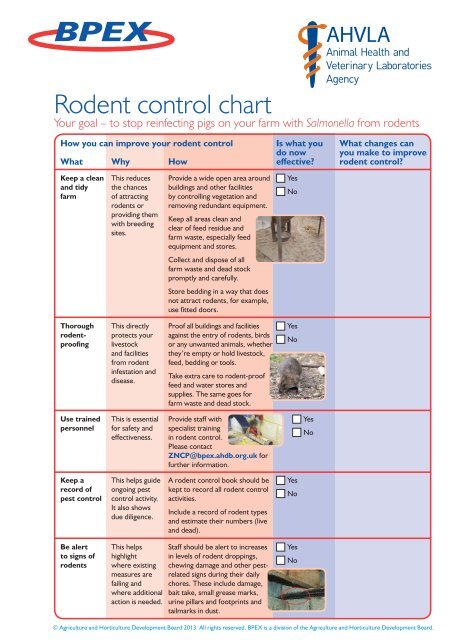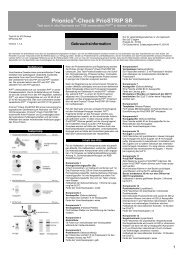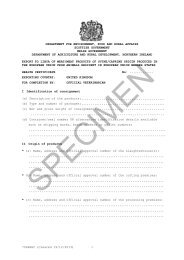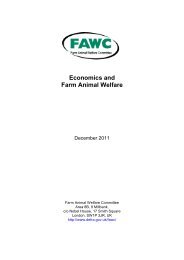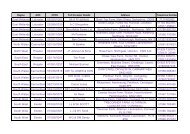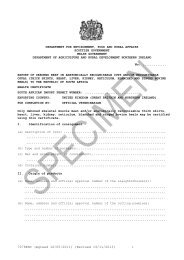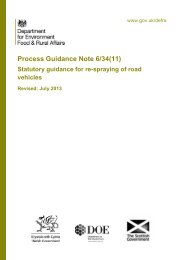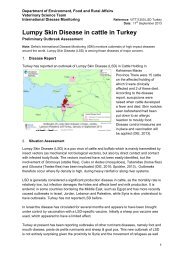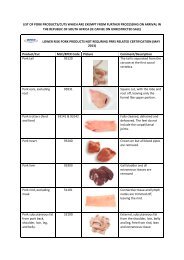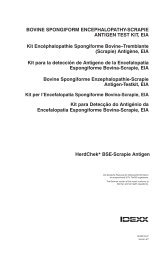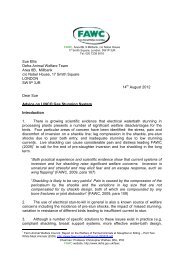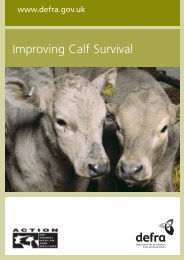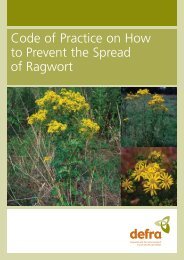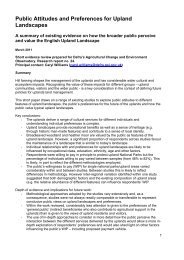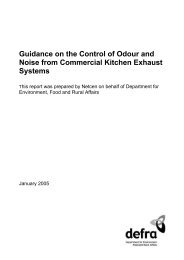BPEX Rodent Factsheet 2 22/01/13.indd - Defra
BPEX Rodent Factsheet 2 22/01/13.indd - Defra
BPEX Rodent Factsheet 2 22/01/13.indd - Defra
Create successful ePaper yourself
Turn your PDF publications into a flip-book with our unique Google optimized e-Paper software.
<strong>Rodent</strong> control chart<br />
Your goal – to stop reinfecting pigs on your farm with Salmonella from rodents<br />
How you can improve your rodent control<br />
What Why How<br />
Is what you<br />
do now<br />
effective?<br />
What changes can<br />
you make to improve<br />
rodent control?<br />
Keep a clean<br />
and tidy<br />
farm<br />
This reduces<br />
the chances<br />
of attracting<br />
rodents or<br />
providing them<br />
with breeding<br />
sites.<br />
Provide a wide open area around<br />
buildings and other facilities<br />
by controlling vegetation and<br />
removing redundant equipment.<br />
Keep all areas clean and<br />
clear of feed residue and<br />
farm waste, especially feed<br />
equipment and stores.<br />
Yes<br />
No<br />
Collect and dispose of all<br />
farm waste and dead stock<br />
promptly and carefully.<br />
Store bedding in a way that does<br />
not attract rodents, for example,<br />
use fitted doors.<br />
Thorough<br />
rodentproofing<br />
This directly<br />
protects your<br />
livestock<br />
and facilities<br />
from rodent<br />
infestation and<br />
disease.<br />
Proof all buildings and facilities<br />
against the entry of rodents, birds<br />
or any unwanted animals, whether<br />
they’re empty or hold livestock,<br />
feed, bedding or tools.<br />
Take extra care to rodent-proof<br />
feed and water stores and<br />
supplies. The same goes for<br />
farm waste and dead stock.<br />
Yes<br />
No<br />
Use trained<br />
personnel<br />
This is essential<br />
for safety and<br />
effectiveness.<br />
Provide staff with<br />
specialist training<br />
in rodent control.<br />
Please contact<br />
ZNCP@bpex.ahdb.org.uk for<br />
further information.<br />
Yes<br />
No<br />
Keep a<br />
record of<br />
pest control<br />
This helps guide<br />
ongoing pest<br />
control activity.<br />
It also shows<br />
due diligence.<br />
A rodent control book should be<br />
kept to record all rodent control<br />
activities.<br />
Include a record of rodent types<br />
and estimate their numbers (live<br />
and dead).<br />
Yes<br />
No<br />
Be alert<br />
to signs of<br />
rodents<br />
This helps<br />
highlight<br />
where existing<br />
measures are<br />
failing and<br />
where additional<br />
action is needed.<br />
Staff should be alert to increases<br />
in levels of rodent droppings,<br />
chewing damage and other pestrelated<br />
signs during their daily<br />
chores. These include damage,<br />
bait take, small grease marks,<br />
urine pillars and footprints and<br />
tailmarks in dust.<br />
Yes<br />
No<br />
© Agriculture and Horticulture Development Board 2<strong>01</strong>3. All rights reserved. <strong>BPEX</strong> is a division of the Agriculture and Horticulture Development Board.
How you can improve your rodent control<br />
What Why How<br />
Is what you<br />
do now<br />
effective?<br />
What changes can<br />
you make to improve<br />
rodent control?<br />
Evening<br />
checks<br />
Proper checking<br />
routines also<br />
prevent other<br />
secondary<br />
problems<br />
such as fly<br />
infestations.<br />
An evening check should be<br />
made after dark every two<br />
weeks to check on the level of<br />
live rodents visible on the unit.<br />
Yes<br />
No<br />
Well<br />
planned and<br />
maintained<br />
rodent<br />
control<br />
This is essential<br />
for safety and<br />
effectiveness.<br />
Consult<br />
a trained<br />
professional<br />
for specific<br />
guidance.<br />
Maintain appropriate rodent<br />
baiting and trapping points<br />
inside and outside each<br />
building, as well as around the<br />
perimeter of the site. Be sure<br />
to include wall and ceiling<br />
space baiting where this can<br />
be done safely.<br />
Keep all baits and traps well<br />
away from pigs.<br />
Yes<br />
No<br />
Keep bait dry and clean, and<br />
change it regularly.<br />
Dispose of dead rodents<br />
promptly – this is essential<br />
for safety and effectiveness.<br />
Consult a trained professional<br />
for specific guidance.<br />
Weekly<br />
checks<br />
This is essential<br />
to keep pest<br />
control on<br />
track.<br />
A weekly check should be<br />
made of the proofing and<br />
control procedures put in place<br />
to exclude rodents from<br />
livestock areas and feed<br />
stores.<br />
Check baiting points regularly,<br />
use correctly and dispose<br />
of dead rodents safely and<br />
promptly.<br />
Also check and record for<br />
signs of rodents eg droppings.<br />
Yes<br />
No<br />
Domestic<br />
pets<br />
All pets<br />
can spread<br />
Salmonella to<br />
both livestock<br />
and your family.<br />
Do not bring pets onto the farm<br />
(even if they are ‘good ratters’ or<br />
‘mousers’!)<br />
Yes<br />
No<br />
© Agriculture and Horticulture Development Board 2<strong>01</strong>3. All rights reserved.<br />
<strong>BPEX</strong> is a division of the Agriculture and Horticulture Development Board.<br />
<strong>BPEX</strong>, Stoneleigh Park, Kenilworth, Warwickshire CV8 2TL<br />
Tel: 0247 647 8877 Email: pighealth@bpex.ahdb.org.uk Website: www.pighealth.org.uk


